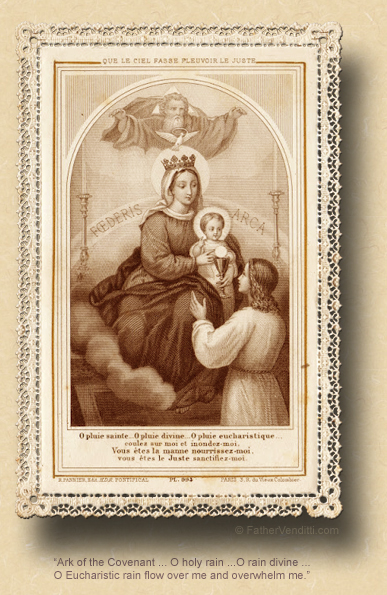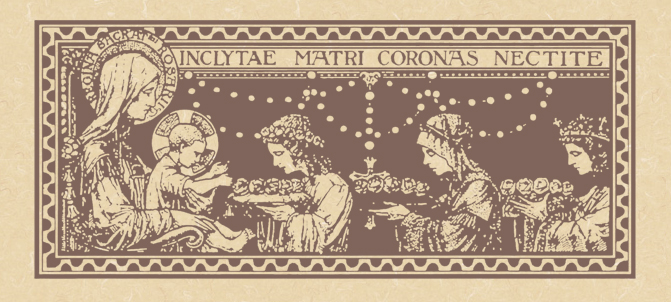Chance of Precipitation: ∞ %.
The Second Saturday of Lent.*
Lessons from the feria, according to the ordinary form of the Roman Rite:
• Deuteronomy 26: 16-19.
• Psalm 119: 1-2, 4-5, 7-8.
• Matthew 5: 43-48.
Ember Saturday of Lent.**
Lessons from the feria, according to the extraordinary form of the Roman Rite:
• Deuteronomy 26: 12-19.
• Psalm 78: 9-10.
• I Thessalonians 5: 14-23.
• Psalm 116: 1-2.
• Matthew 17: 1-9.
• Deuteronomy 11: 22-25.
• Psalm 83: 10, 9.
• Machabees 2: 1, 23-27.
• Psalm 89: 31, 1.
• Ecclesiasticus 36: 1-10.
• Psalm 140: 2.
• Daniel 3: 47-56.
The Second Saturday of the Great Fast; the Second All Souls Saturday;*** the Feast of Our Venerable Father Leo, Bishop of Catania; and, the Feast of Our Holy Father Agathon, Pope of Rome.
First & third lessons from the triodion, second & fourth from the menaion of the dead, according to the Ruthenian recension of the Byzantine Rite:
• Hebrews 3: 12-16.
• I Thessalonians 4: 13-17.
• Mark 1: 35-44.
• John 5: 24-30.
FatherVenditti.com
|
 8:58 AM 2/20/2016 — I didn't preach at yesterday's Mass primarily because its Gospel lesson and today's constitute two parts of the same thematic passage, in which our Lord gives us his familiar declaration wherein he replaces a moral dictum of the Old Testament, such as “an eye for an eye,” with his own unyielding precept, usually precipitated with the formula: “You have heard it said…but I say….” In this particular case it's the one about how we should react to our enemies. But, included in his precept about loving ones enemies is the all too forgotten statement that God “makes his sun rise on the bad and the good, and causes rain to fall on the just and the unjust” (Matt. 5: 45 RM3). 8:58 AM 2/20/2016 — I didn't preach at yesterday's Mass primarily because its Gospel lesson and today's constitute two parts of the same thematic passage, in which our Lord gives us his familiar declaration wherein he replaces a moral dictum of the Old Testament, such as “an eye for an eye,” with his own unyielding precept, usually precipitated with the formula: “You have heard it said…but I say….” In this particular case it's the one about how we should react to our enemies. But, included in his precept about loving ones enemies is the all too forgotten statement that God “makes his sun rise on the bad and the good, and causes rain to fall on the just and the unjust” (Matt. 5: 45 RM3).
We often allow this particular phrase to pass us by because it just doesn't sound right to us. It offends our sense of justice. Those who do good should be rewarded, and those who do evil should be punished; that's how we've been raised to think. Our Lord is not challenging that; he's simply pointing out that reward and punishment do not come in this life; they come in the next. That's hard to wrap our brains around because, despite our Catholic upbringing, we live in a Protestant society, where faithfulness to God is rewarded here on earth. That's why all the Evangelical preachers you see on television are dressed to the nines: they need to show how prosperous they are to prove that they are blessed by God.
We don't do that because we listen to the whole of our Lord's teachings, whether its about his real Body and Blood in the Eucharist, or, as in this case, the fact that reward and punishment do not come in this life, but in the next.
Let us pray that, in our daily combat to live the Gospel every day, we will be given the grace to keep our eyes fixed on heaven as our true reward.

* Today is designated "Saturday of the First Week of Lent" in the Roman Missal Third Edition. Cf. the post here for an explanation of how the days of Lent are identified on this site.
** Cf. the note to last Wednesday's homily for an explanation of the Ember Days and their significance.
*** Unlike the Latin Church, which commemorates the Holy Souls but one day each year on November 2nd, the Churches of the Byzantine Tradition observe an All Souls Day five times each year: once just prior to the Triodion (pre-Lent), three times during the Great Fast, and once during the Paschal season, all on a Saturday. They are commonly referred to as the All Souls Saturdays. Their lessons and texts are added, as usual, to whatever other observances occur on that day.
|

